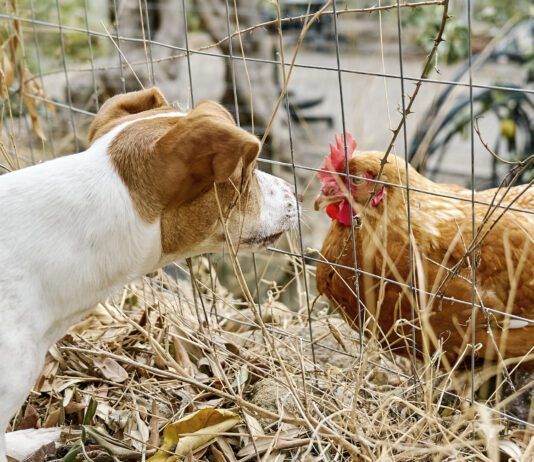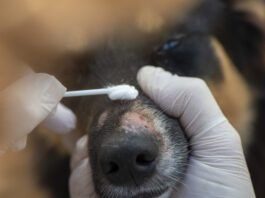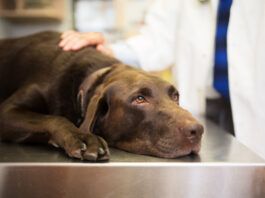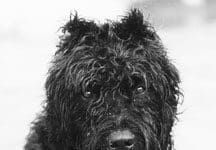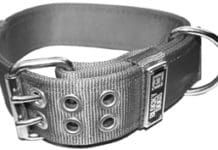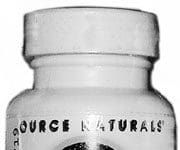Heartworm: Don’t Take it Lightly
People have learned of the benefits of a natural diet and limited vaccinations, and have seen the health improvements in their dogs from these changes. Now, many want to know if they can discontinue administering heartworm preventatives to their dogs, or whether those can be replaced by natural options.
Fending Off the Flu
It’s not neccessary to put your dog in solitary because of viral threats.
Vaccination and Canine Distemper Virus (CDV)
When we decided not to vaccinate Caleb, our Bouvier des Flandres, against anything other than rabies, my friend Janice and I knew we ran a risk that he might develop a dreaded disease. We also knew that vaccination doesn't always protect against disease, and believed it sometimes causes illness. We felt the home-prepared BARF (bones and raw foods) diet we fed him would help his body fight off many health problems. Naturally, we hoped that Caleb would never come down with anything serious like canine distemper virus (CDV). But, when he was three years old, we had to face and overcome exactly that challenge.
Watch Out for a Misdiagnosis of Chronic Kidney Disease in Dogs
new strains of the disease have appeared strains that may not be detected by standard tests.üFour-year-old Louis succumbed to ehrlichiosis. Initially diagnosed with kidney disease
Help for Dogs With Hypothyroidism
Many people are aware that hypo-thyroidism (low thyroid function) is a medical condition that can cause an afflicted dog to become lethargic, dull, and fat. But far too few dog owners are aware of the behavioral symptoms that hypothyroid can cause. This is unfortunate, since these symptoms include unexplainable aggression, so-called rage syndrome
Understanding the Dog Respiratory System
The respiratory system functions rather miraculously. Vital for life, critical for the health of the whole body, it’s one of the major ways the dog’s body unites his external environment with his inner milieu. As a primary site of contact with the outer world, the lungs are susceptible to diseases that can be caused by any airborne germ, irritant, or toxin that happens to be floating around.
Epileptic Dogs Can Live Normally
Don't despair if your dog has seizures or is diagnosed with epilepsy. Informed care and complementary methods can help these dogs live long, happy lives. Seizures can occur for a variety of reasons across the whole range of ages, and are the most common neurological disorder found in dogs. Making the diagnosis of canine epilepsy is a process of elimination.
Canine Glandular or Organ Therapy
The premise seems simple - if your dog has liver problems, feed him liver. What if it's a kidney, thyroid, or adrenal problem? Then feed kidney, thyroid, or adrenal tissue. This is, in its simplest form, glandular or organ therapy. The process has become much more refined over the years. Now your dog can experience the benefits of glandular therapy even when you can't find the raw glands or other organs to feed him. Now, glandulars (the common term for products containing animal cells even if they aren't from glands) are available in tablet, capsule, and liquid form, depending on the manufacturer.
Symptoms of Addison’s Disease
The signs of this potentially fatal condition mimic those of many other diseases. Treatment can be complex and expensive. Holistic medicine can help. Addison’s disease is the common name for hypoadrenocorticism, or adrenal insufficiency. The adrenal glands do not produce enough, if any, of a number of hormones, including aldosterone, which maintains sodium and potassium levels to regulate blood pressure (among other important functions), and cortisol, which helps the body metabolize glucose and deal effectively with physical and mental stresses of all kinds.
Liver Health in Dogs
Promoting the health of your dog's liver may be the key to preserving his long-term health. The liver, located centrally in the dog's body as the link between the breathing and circulatory activities of the chest and the digestive functions of the abdomen, works hard at its many tasks. The liver manufactures blood proteins and fat, and stores energy, fat-soluble vitamins, and iron.
Heartworm Treatment Options
The heartworm (Dirofilaria immitis) is a nematode or roundworm named for its place of residence, inside the heart. To understand the challenge of controlling this parasite, you have to understand its life cycle, a complex and slightly bizarre process. Living in a dogs pulmonary arteries, adult heartworms mate. Each female (which can reach sizes of up to 11 inches) produces thousands of eggs, each less than 1/800th of an inch, which are called microfilariae, and circulate in the blood.


